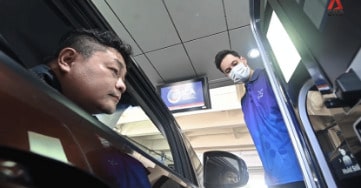
The Immigration and Checkpoints Authority (ICA) has announced that starting in 2024, Singapore residents and visitors can clear immigration without their passports, The Straits Times reports. Instead, they will use biometric technology from Idemia.
The ICA originally announced its new clearance concept (NCC) in 2019. In place of passports, travelers can use face biometrics checks and QR codes for vehicles or the new, contactless Automated Border Control System (ABCS) for passengers. Approximately 800 automated lanes will replace manual counters at checkpoints in the first quarter of 2024.
The NCC transformation plan aims to provide faster and more secure immigration and Customs clearance, with trials conducted at Tuas Checkpoint and Changi Airport Terminal 4 in 2019. Automated Passenger In-Car Clearance System (Apics) was trialed in 2022, with 94 percent of travelers capable of using it without assistance.
This is part of ICA’s transformation plan towards a “No Fuss; No Visit; No Waiting” experience and marks its 20th anniversary since the merger of Singapore’s Immigration and Registration Department.
ICA is collaborating with the Home Team Science and Technology Agency (HTX) to roll out Automated Passenger In-Car Clearance System (Apics) in phases at land checkpoints. Travelers who are driving can use the MyICA mobile app to create a profile and get a QR code. They can then scan the code at the manual immigration counters. The ICA officers will use the QR code data to conduct biometric facial image checks on them. Travelers can use the same QR code for future trips if passport details remain unchanged, the ICA says.
The ABCS is supplied by Idemia, in the form of its Augmented Borders Suite, ID-Look devices and back end systems.
“We’re thrilled to be awarded this high-profile contract that showcases our ability to surpass our customers’ expectations, our ongoing and significant investment in innovation and our capacity to roll out our technologies at scale. We look forward to paving the way for a future digital travel era,” says Idemia Executive Vice President of Public Security and Identity Matt Cole in a company announcement.
Idemia has been supplying biometrics to Singapore’s government for border security checks since a 2017 deployment at Changi Airport.
The details of its new, country-wide contract were not disclosed.
Apics lanes will, in stages, be implemented at Singapore’s Tuas and Woodlands Checkpoints from 2026 and 2028, respectively. The lanes use QR code scanning and biometric identity verification to reduce the need for officers stationed at every car lane.
The Minister for Home Affairs and Law, K Shanmugam, the guest of honor at the event, says that ICA has been “agile, clear-sighted, bold” in adapting to new challenges posed by increasing traveler and cargo volumes.
The ICA added that a new Services Center would be located next to the existing building in Kallang and will open for operations in 2024. It is expected to become a one-stop center for all ICA-related services, including passport application, identity card registration and self-collection of identity cards and passports.
Singapore recently made headlines for introducing additional e-gates with biometric technology developed by Tascent and NEC to its immigration process following an incident that caused lengthy delays at border crossings and resulted in 21 passengers missing their flights. The automated biometric immigration lanes are now open to travelers without needing pre-enrollment after 85,000 people were affected by the disruption.
Tascent provided face and iris biometrics for trials at both the Tuas and Woodlands Checkpoints, prior to its dissolution in March of this year. Idemia supplied the automated gates in both cases.
Article: Singapore announces passport-free biometric clearance at borders from 2024